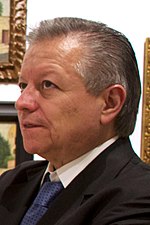Arturo Zaldívar Lelo de Larrea, Date of Birth, Place of Birth
TweetArturo Zaldívar Lelo de Larrea
Mexican judgeAbout Arturo Zaldívar Lelo de Larrea
- Justice Arturo Zaldívar Lelo de Larrea (born August 9, 1959) is a Mexican lawyer who has been a member of the Supreme Court of Justice of the Nation since December 2009.
- Since January 2, 2019, he is the President of the court. He obtained his Law degree at the Escuela Libre de Derecho (ELD) and completed a Law PhD at the National Autonomous University of Mexico.
- He has tenure of second year Constitutional Law at ELD and is Graduate School Professor at the same school of both Constitutional Law and Constitutional Procedure.
- He is also Professor of the Law Faculty at UNAM, of the LL.M.
- program at the Universidad Panamericana (UP), and of the LL.B.
- (Bachelor of Laws) at Universidad Iberoamericana. He was a member of the commission created by the Supreme Court, in charge of reforming the Ley de Amparo (the law concerning the partial judicial review and the protection of the civil rights embedded in the Constitution). He was a consultant for the Law division of the Instituto Tecnológico Autónomo de México (ITAM) regarding the design of the Graduate Program in Administrative Law, member of the academic committees of the Instituto de la Judicatura Federal (Institute of Federal Judicature) and the Tribunal Electoral del Poder Judicial de la Federación (Federal Electoral Tribunal). He held a private practice for 25 years. He was founder and Vice President of the Instituto Mexicano de Derecho Procesal Constitucional (Mexican Institute of Constitutional Procedure), member of the Mexican division of the directive committee of the Instituto Iberoamericano de Derecho Procesal Constitucional (Iberoamerican Institute of Procedural Constitutional Law), member of the graduate school counsel of Constitutional Law and Human Rights program at UP, member of the Barra Mexicana-Colegio de Abogados (Mexican Bar and Advocate’s College).
- He is also member of several Law Review committees and consultant for a number of Law Schools and Law Institutes in the Country and the region. He is the author of Hacia una nueva ley de Amparo (Towards a new Ley de Amparo) and has published more than seventy essays in specialized journals and international publications.
Read more at Wikipedia


 Date of Birth:
Date of Birth:  Place of Birth: Querétaro, Mexico
Place of Birth: Querétaro, Mexico